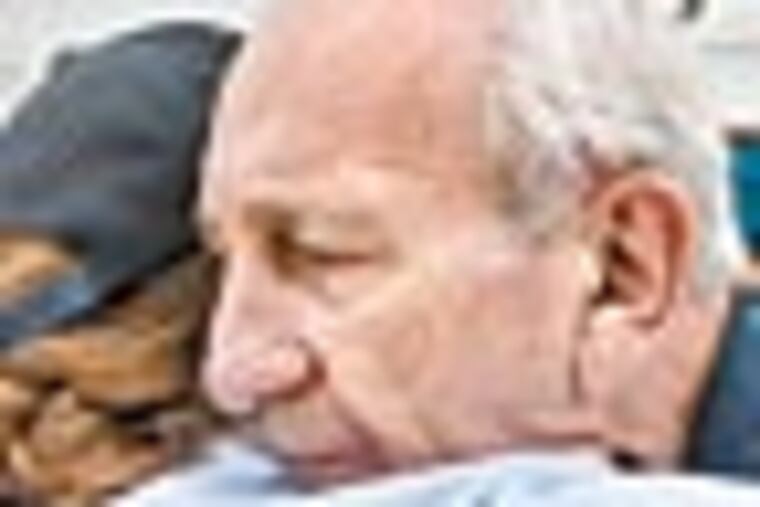WWII vets honored on a Delaware cruise
They ate barbecue on a Coast Guard cutter in the Delaware River Monday, smiling and laughing, only occasionally talking about the terrible days that bond them.

They ate barbecue on a Coast Guard cutter in the Delaware River Monday, smiling and laughing, only occasionally talking about the terrible days that bond them.
They are old now - many well into their 80s - with rough hands and slow gaits.
Like any other tourists, they snapped photos, floating on brown water under gray skies on a cruise created in their honor.
The pictures were benign counterpoints to the awful images that every member of the Delaware Valley Chapter of the Veterans of the Battle of the Bulge carries in his head.
"We honor you," said Lt. Peggy Britton, commanding officer of the Coast Guard cutter William Tate. "I was getting choked up hearing your stories."
A student of World War II, Britton said she wanted to expose her 24 young sailors to the veterans. "They embody the American spirit, and American goodness, a high set of morals and ethics," she said.
As a gift, she offered the veterans a little time in her world on the Delaware.
"I just wanted my crew to have a chance to talk to the greatest generation," Britton explained, referencing Tom Brokaw's book about the men who fought World War II.
In particular, the 47 who bobbed on the William Tate fought in the ferocious Battle of the Bulge, a monthlong German offensive in the snows of Belgium that raged from December 1944 to January 1945.
Approximately 19,000 Americans were killed and 47,000 were wounded. About 17,000 Germans died.
"It was ugly, terrible," said Stanley Wojtusik, 84, president of the Delaware Valley chapter, who lives in Torresdale. "You wouldn't wish it on your worst enemy."
Like many men of their generation, the veterans are used to keeping feelings bottled inside, stoic soldiers to the end.
But on occasion they expose the existential agonies within.
"I have trouble talking about it," said Ken Johnson, 88, of Brick, N.J., a tall, slender man with wispy white hair. "But I wonder still, 'Why am I here?' You have all these questions in your mind.
"When guys are killed to the right of you, then to the left of you, but you're allowed to live on -," he said, unable to continue as he teared up.
"The story Band of Brothers [an HBO depiction of World War II] - that's my story, from beginning to end. You get closer with guys you're with than anyone else in life. But you have memories of them being blown apart. You don't get over those things."
No, you don't, Frank Latorre, 87, of West Deptford, agreed. But you try not to let it consume your life, he added.
Latorre, originally of South Philadelphia, wasn't supposed to fight in the war. He had a punctured ear drum as a child, which excused him from service.
But back in the 1940s, when the world was at war and Americans felt imperiled, guys from South Philly weren't looking for ways out of fighting.
"I drank with guys from the corner who were going to war," Latorre said, smiling. "We all went to the draft board at the same time. I had to go with those guys."
Somehow, Latorre's malady went unnoticed and he found himself driving an armored vehicle onto Utah Beach in the D-Day invasion.
He saw battle. He helped liberate Jews from concentration camps. And, when the war ended, he partied in Paris.
"It was interesting, you know what I mean?" he said.
Ted Paluch, 87, of Center City, does. He was a survivor of the Malmédy Massacre during the Battle of the Bulge, in which 84 American prisoners of war were shot by their German captors.
With a wounded hand, the unarmed Paluch hid in a hedgerow on the edge of the field in which his comrades were killed.
In a moment Paluch replays in his head, a German soldier saw him, but didn't shoot.
"War is funny," the bright-eyed, dapper veteran said, a brown hat cocked on his head. "The Lord was with me, I guess."
God or no God, the experience was so unnerving that Paluch coped by "getting drunk every night after that for three months. But I stopped drinking 30 years ago."
When the war ended, the men returned home to raise families. Their work lives were calm, safe, quiet.
Wojtusik got a job with the Keystone Auto Club. Johnson became an engineer. Latorre was a supervisor in a Pepsi plant. And Paluch made discs turned into records by Chubby Checker and others in South Philadelphia.
The bulk of their lives were spent in peaceful pursuits.
But so much of who they are was forged in the heat and fire of a battle that took place 66 years ago.
"They call us the greatest generation," Paluch said. "But that's just a tag. Every generation is the same. And every one would have stood up like we did if something like World War II came up for them."